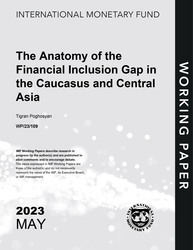
The Anatomy of the Financial Inclusion Gap in the Caucasus and Central Asia
The Anatomy of the Financial Inclusion Gap in the Caucasus and Central Asia
READ MORE...
Volume/Issue:
Volume 2023
Issue 109
Publication date: May 2023
ISBN: 9798400243431
$20.00
Add to Cart by clicking price of the language and format you'd like to purchase
Available Languages and Formats
| English |
Prices in red indicate formats that are not yet available but are forthcoming.
Topics covered in this book
This title contains information about the following subjects.
Click on a subject if you would like to see other titles with the same subjects.
Exports and Imports , Finance , Economics- Macroeconomics , Economics / General , Caucasus and Central Asia , financial inclusion , financial access , estimation result , CEE comparator , CCA country , IMF working paper 23/109 , CEE peer , Financial sector development , Financial account , Financial sector , Income , Global , Central Asia and the Caucasus
Summary
This paper analyses how financial inclusion in the Caucasus and Central Asia (CCA) compares to peers in Central and Eastern Europe (CEE). Using individual-level survey data, it shows that the probability of being financially included, as proxied by account ownership in financial institutions, is substantially lower across gender, income groups, and education levels in all CCA countries relative to CEE comparators. Key determinants of this financial inclusion gap are lower financial and human development indices, weak rule of law, and physical access to bank branches or ATMs. This suggests that targeted policies aimed at boosting financial and human development, strengthening the rule of law, and supporting fintech solutions can broaden financial inclusion in the CCA.
Copyright © 2010 - 2026
Powered by:
AIDC



